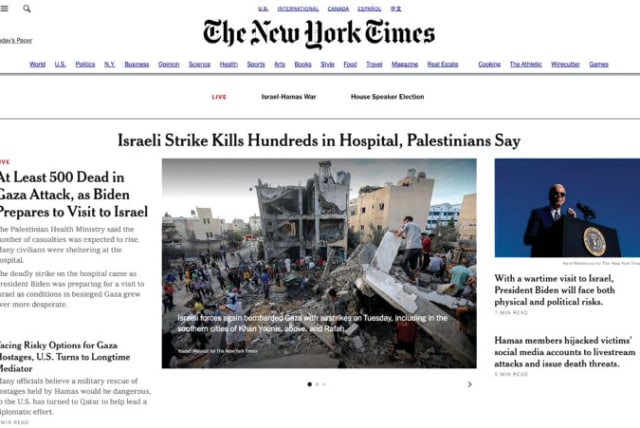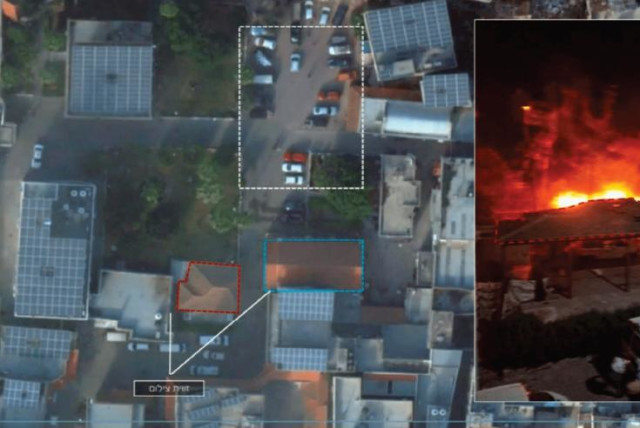Fighting the media battle amid the Israel-Hamas war - comment

Consume the news with a grain of salt and a healthy dose of skepticism, especially during a war that also involves a battle being waged in the media.
The war between Israel and Hamas has posed challenges to the media and journalists. Facing difficulties in verifying facts and fatalities, particularly in the Gaza Strip, there has been a plethora of fake news and false reporting, in both mainstream and social media. It’s hard for us to know what’s really going on in Gaza because the global media aren’t there, and they primarily rely on reports whose source is often linked to Hamas.
Perhaps the best example is the explosion in the car park of al-Ahli Arab Hospital in Gaza City on October 18, 11 days after the surprise Hamas assault and Israel’s declaration of war. Without hesitation, many news organizations published the Hamas Health Ministry’s claim that the blast had been caused by an Israeli airstrike, killing 471 people and wounding 342.
By the time it became clear that the IDF’s assessment – that it had probably been the result of an errant rocket fired by Palestinian Islamic Jihad (PIJ) at Israel – was correct, it was too late. The damage had been done. Israel was portrayed in the media as a careless aggressor and the Gazans as helpless victims. As the Wikipedia entry on the incident notes, it triggered massive protests in the Middle East and across the world. Jordan even canceled a summit on the war set to be hosted by King Abdullah, with US President Joe Biden, Egyptian President Abdel Fattah el-Sisi and Palestinian Authority President Mahmoud Abbas, after Abbas said he would not attend in protest of the Israeli action.
The truth of the Gaza hospital bombing
The Anglican Diocese that manages the hospital later reported that the actual death toll had been closer to 200. It was a tragedy, to be sure, but not a war crime perpetrated by Israel. Leading media outlets issued corrections, clarifications, and apologies.
Several days after BBC correspondent Jon Donnison told viewers on the evening of the incident, “It’s hard to see what else this could be, really, given the size of the explosion, other than an Israeli airstrike or several airstrikes,” BBC’s deputy director of news Jonathan Munro conceded it had made a mistake in its live coverage. The BBC issued an apology on October 23, saying: “We accept that even in this fast-moving situation, it was wrong to speculate in this way about the possible causes, and we apologise for this.”
The New York Times published an Editors’ Note, saying its initial reporting had “left readers with an incorrect impression about what was known and how credible the account was.“
The newspaper’s first dispatches, which included a banner headline across its website, led with Hamas officials stating that the explosion at the hospital had been caused by an Israeli airstrike. According to the Editors’ Note, “The early versions of the coverage – and the prominence the story received in a headline, news alert, and social media channels – relied too heavily on claims by Hamas and did not make clear that those claims could not immediately be verified.”
On November 26, Human Rights Watch issued the findings of its thorough investigation of the incident, which it said included a probe of photos and videos, analyzing satellite imagery, interviewing witnesses, reviewing analyses by other organizations, and consulting experts. “The explosion that killed and injured many civilians at al-Ahli Arab Hospital in Gaza on October 17, 2023, resulted from an apparent rocket-propelled munition, such as those commonly used by Palestinian armed groups, that hit the hospital grounds,” it determined.
The conclusion is clear: Consume the news with a grain of salt and a healthy dose of skepticism, especially during a war that also involves a battle being waged in the media. And if you must choose between opposing narratives, the official version presented by a free and democratic state is preferable to the claims of a terrorist organization.
Jerusalem Post Store
`; document.getElementById("linkPremium").innerHTML = cont; var divWithLink = document.getElementById("premium-link"); if (divWithLink !== null && divWithLink !== 'undefined') { divWithLink.style.border = "solid 1px #cb0f3e"; divWithLink.style.textAlign = "center"; divWithLink.style.marginBottom = "15px"; divWithLink.style.marginTop = "15px"; divWithLink.style.width = "100%"; divWithLink.style.backgroundColor = "#122952"; divWithLink.style.color = "#ffffff"; divWithLink.style.lineHeight = "1.5"; } } (function (v, i) { });

